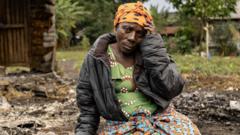Axel Rudakubana, a British teen with a history of violent thoughts, executed a shocking attack at a dance class, resulting in three fatalities. His case prompts urgent calls for reevaluation of counterterrorism strategies and how authorities handle youth exhibiting violent behavior without extremist motivations.
A Tragic Stabbing Incident Raises Questions About Youth Violence and Counterterrorism

A Tragic Stabbing Incident Raises Questions About Youth Violence and Counterterrorism
The case of Axel Rudakubana, whose knife attack left three girls dead, ignites national discussions on the complexities of youth aggression and existing security frameworks.
In a heartbreaking escalation of violence on British soil, Axel Rudakubana, an 18-year-old formerly fixated on extreme violence, made headlines for a tragic stabbing spree that left three young girls dead during a Taylor Swift-themed dance class in Southport. The incident raised urgent discussions about how authorities can better address young individuals whose obsessions with violence do not align with traditional extremist ideologies.
The roots of this troubling story can be traced back to a chilling phone call made when Rudakubana was just 13. He contacted a child welfare hotline and posed a disturbing question: "What should I do if I want to kill somebody?" Following an assessment of his situation, law enforcement was alerted, revealing that he had brought a knife to school due to bullying concerns. Yet despite multiple red flags, Rudakubana's violent tendencies slipped through the cracks of various support systems.
On July 29, 2024, the unspeakable happened when Rudakubana unleashed his fury at the dance studio, with results that have left a profound mark on the nation. Not only did he murder three innocent girls and injure numerous others, but the fallout also ignited riots across England, fueled by misinformation surrounding the motives of his attack, including erroneous claims of it being an act of Islamist terrorism.
In response, Rudakubana has been sentenced to life imprisonment, but the broader societal implications of this tragedy are just beginning to unfold. Experts and government officials are calling for a reevaluation of strategies, particularly the counterterrorism program known as Prevent, which Rudakubana was referred to on three separate occasions. Questions loom large: how can authorities identify and intervene with youth whose violence is self-directed rather than guided by a specific ideology, and is the existing legal framework adapted to effectively combat this new challenge?
As Britain grapples with this unsettling reality, the future of how society, law enforcement, and mental health services engage with at-risk youth is under intense scrutiny. With Prime Minister Keir Starmer hinting at necessary changes to laws established post-9/11, a pivotal moment for preventing such tragedies from reoccurring may be at hand.






















